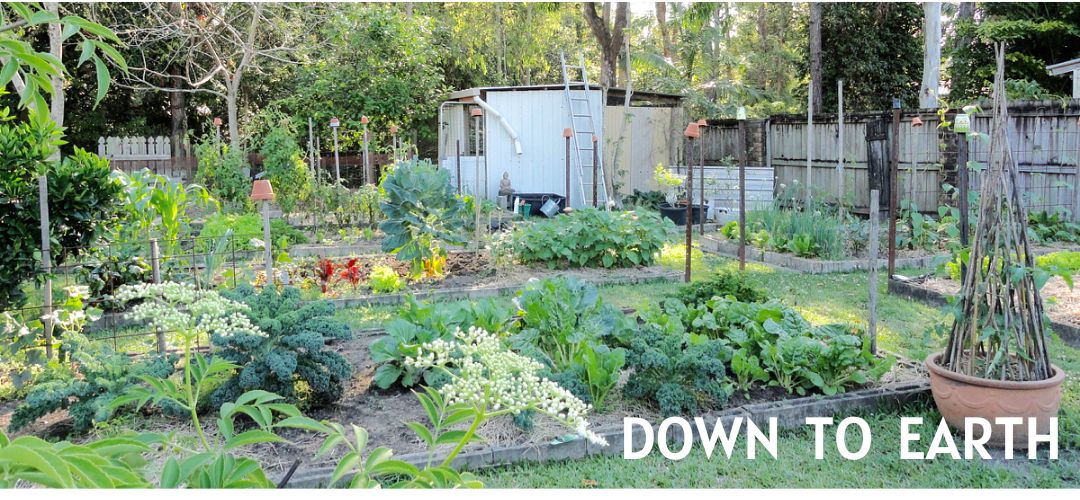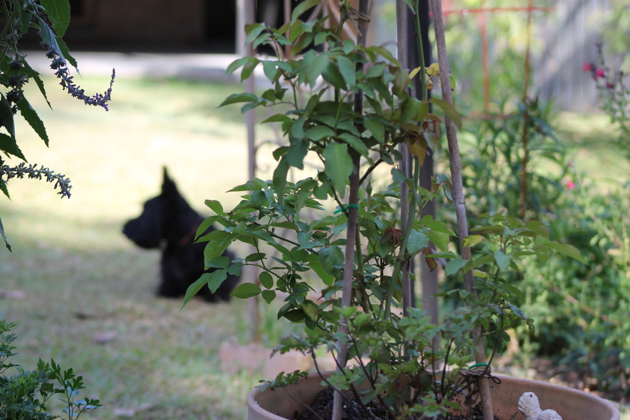We've reached the point in our gardening year when we've stopped planting. We still have a fair bit of gardening to do but there will be no new plants added. Our leafy greens finished early because of the large numbers of insects this year. We don't fight them with insecticides, we just stop growing what they eat. The tomatoes and cucumbers are in and mulched, now I have to keep the water up to the citrus and berries so that in a year of less rain than normal here, we'll still have a good supply of fruit in the coming autumn and winter. Thank heavens for tank water.
We're always working for now but planning for what will come later in the garden. It makes things easier when we know what's ahead and are prepared for it. And that applies to our general lives too. We're always planning ahead, always wanting to arrive at a new stage of life with at lease some of the preparation and thinking done so it's not a struggle or a burden.
Always add flowers to your garden because they'll attract beneficial insects. Purple, blue and yellow flowers seem to be the most attractive to insects where I live but all flowers will lure bees, wasps and hoverflies in. Above is The Fairy rose and below is a blue sage that grows two metres high. It requires hardly any watering and is a great plant for dry gardens.
We're always working for now but planning for what will come later in the garden. It makes things easier when we know what's ahead and are prepared for it. And that applies to our general lives too. We're always planning ahead, always wanting to arrive at a new stage of life with at lease some of the preparation and thinking done so it's not a struggle or a burden.
Always lurking - the black shadow, ready to bite any toe at any time.
And here she is playing with Jamie.
Always add flowers to your garden because they'll attract beneficial insects. Purple, blue and yellow flowers seem to be the most attractive to insects where I live but all flowers will lure bees, wasps and hoverflies in. Above is The Fairy rose and below is a blue sage that grows two metres high. It requires hardly any watering and is a great plant for dry gardens.
I often get emails asking about this and that relating to gardening but one of the most often asked questions is: What should I grow? I can never answer that question because my climate might be totally the opposite of yours, our tastes might differ and I have time whereas, you might not have. When planning your garden, grow what you eat. Make a list of every vegetable you eat. Research what season each plant grows in and what conditions they need, discard those you can't grow, then divide your list into seasons - that is your planting list. If you've got too many on the list, work out which vegetables are the best picked and eaten straight away. For example, both corn and peas should be eaten within a few hours of harvesting if you want to experience the best of them. After harvesting, corn and peas start converting their natural sugars into starch and that affects the taste and texture. So if you love corn and peas, plant them. You could also select the most expensive vegetables to buy at the market and grow those because they'll be cheaper and better grown at home, or if you're a new gardener, choose the easiest to grow - lettuce, Asian greens, carrots, radishes.
And don't forget herbs. I routinely use parsley, oregano, basil, rosemary, thyme and mint in my cooking. All of them are easy to grow here and one plant will last at least a season, often two seasons, so it saves me money to grow herbs. I also grow Welsh onions which are perennial green onions. I use them in the same way I use chives or spring/green onions. If I were to buy all those herbs every week, it would cost me at least ten dollars just for herbs. Planting half a dozen herb seedlings in Spring, or keeping perennial or biennial herbs going through the year, is wise economy.
Don't forget fruit trees, passionfruit vines, and berries. These are longer term plants and will cost more than a seedling but they'll produce fruit over a number of years. I think of fruit as an investment. As long as they're fed and watered, they look after themselves. They'll need mulching if you're in a hot area, and pruning occasionally, but they're easy care plants once they're in the ground and growing.
In The Simple Home I wrote about container gardens. They're great if you're renting or don't have much land or time. You'll still get a crop and although it will probably be smaller than an in-the-ground garden harvest, the work load is smaller too.
There is no doubt that you'll reduce your grocery bill and improve your health by growing organic food at home. Some gardeners are held back by doubting their own abilities and some don't know where and how to start. But there is help. There is a large group of gardeners at the forum who will help you with any question you may have. So if you're tempted and have been putting it off until now, start planning what you'll grow. It's a great skill to have and there are many of us older gardeners who will help you get started and then ease you through the first few seasons. 🍄
ADDITIONAL READING
Two guides I've written
How to start a vegetable garden - part 1
How to start a vegetable garden - part 2
The berries are growing well this year. Here is the second flush of blueberries (above) and the Young berry is starting to climb the trellis (below). A farmer in Maleny gave my the Young berry. It's native to northern America and is very similar to a raspberry.
Don't forget fruit trees, passionfruit vines, and berries. These are longer term plants and will cost more than a seedling but they'll produce fruit over a number of years. I think of fruit as an investment. As long as they're fed and watered, they look after themselves. They'll need mulching if you're in a hot area, and pruning occasionally, but they're easy care plants once they're in the ground and growing.
In The Simple Home I wrote about container gardens. They're great if you're renting or don't have much land or time. You'll still get a crop and although it will probably be smaller than an in-the-ground garden harvest, the work load is smaller too.
There is no doubt that you'll reduce your grocery bill and improve your health by growing organic food at home. Some gardeners are held back by doubting their own abilities and some don't know where and how to start. But there is help. There is a large group of gardeners at the forum who will help you with any question you may have. So if you're tempted and have been putting it off until now, start planning what you'll grow. It's a great skill to have and there are many of us older gardeners who will help you get started and then ease you through the first few seasons. 🍄
ADDITIONAL READING
Two guides I've written
How to start a vegetable garden - part 1
How to start a vegetable garden - part 2









